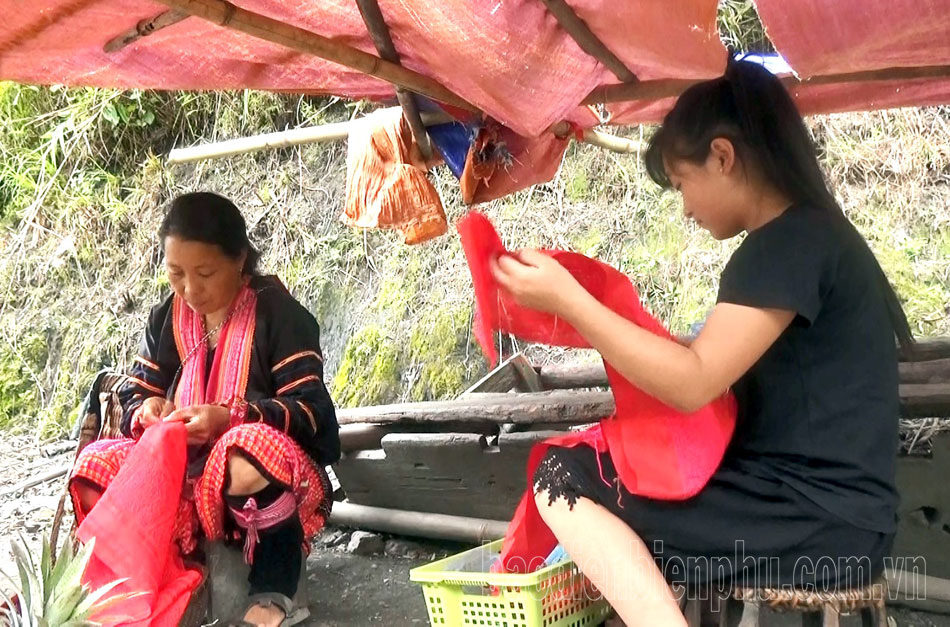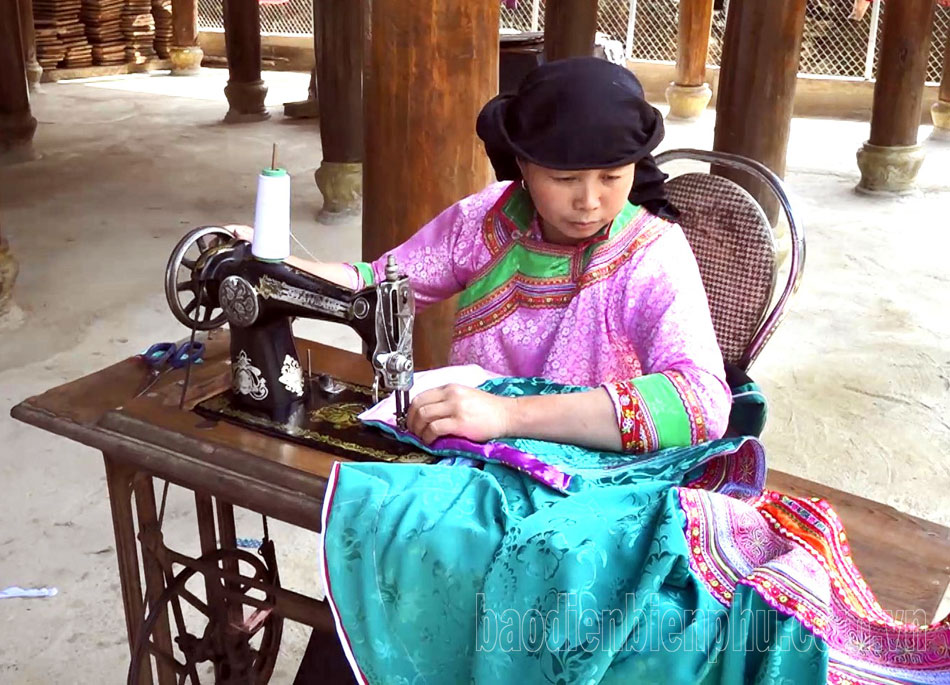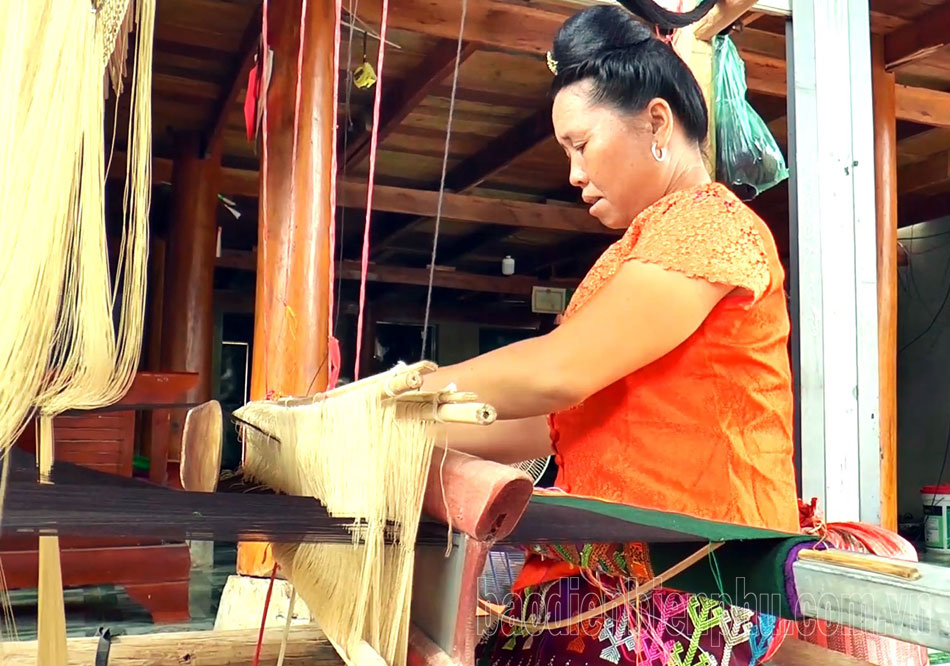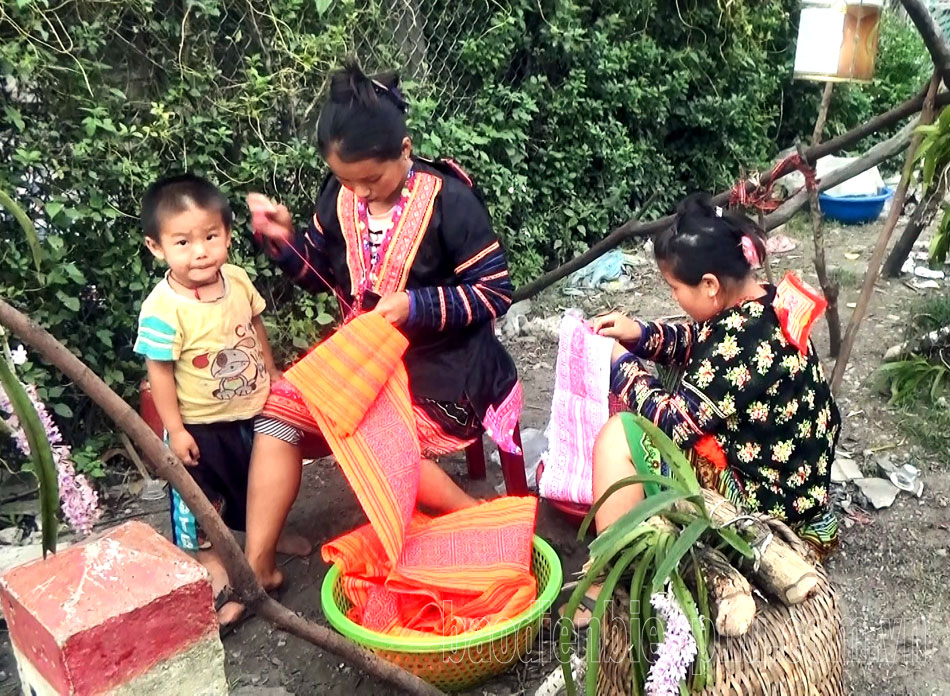The preservation of these cultural elements not only helps safeguard the heritage for future generations but also serves as a foundation for the development of community-based tourism. This approach fosters both cultural pride and economic growth, ensuring that the rich traditions of Điện Biên's ethnic groups continue to thrive.

Hồ Thị Dua from Sa Lông Commune in Mường Chà District teaches her daughter embroidery as a way of preserving the traditional craft.
Since childhood, Hồ Thị Dua from Sa Lông Commune in Mường Chà District was taught by her mother and grandmother how to embroider patterns on fabric to make traditional clothing.
To continue that tradition and preserve their ethnic heritage, Dua has been coaching her daughter on embroidery. This passing of skills from mother to daughter has contributed to keeping the traditional craft of the Mông people in the area alive.
Observing Dua and her daughter embroidering pattern, one can sense how much meticulous undertaking and precision is involved in this traditional craft. A deep love for the art and immense patience are essential for Mông women to produce such intricately crafted traditional garments.
As she skillfully guides her needle through the red fabric, Dua shared: “I don't know when the art of embroidery among Mông Hoa people began, but I was taught by my mother at the age of ten. Now, this traditional beauty, this cultural identity, has become deeply ingrained in Mông women from generation to generation. To preserve this craft, I will pass it on to my children and grandchildren, hoping to keep the traditional skills of our people alive.”

The Xạ Phang women preserve their traditional craft by making their own ethnic clothing.
After busy days working on the farm, during her free time, Lò Thị Đôi, a Lao woman from Mường Luân Commune in Điện Biên Đông District, sits by her loom to weave brocade fabric.
Despite the cultural exchange with other ethnic groups and the presence of many different types of fabric, Đôi, like many Lao women, is determined to maintain the beauty of their traditional clothing. To prevent their craft from vanishing, she teaches and provides instructions to the younger generation in her village, thereby preserving and promoting their ethnic traditions.
Đôi shared: “I learned how to weave fabric as a child, which has helped preserve the culture of our people. In the past, Lao mothers believed that if a girl doesn’t know how to weave, she wouldn't be able to marry. When marrying, Lao girls had to weave brocade to gift to their in-laws.”
“Even now, Lao women like us still wear these traditional clothes every day as well as during festivals. For Lao women, traditional brocade clothing is very important and has been cherished across generations,” she said.

Lò Thị Đôi from Mường Luân Commune in Điện Biên Đông District continues to preserve the traditional brocade weaving craft of the Lao people.
In the context of broader societal development, there have been some conflicts between preserving traditional culture and the demand for comprehensive modernisation, leading to the decline of many customs and practices. However, to preserve and promote traditional values, Điện Biên Province has been working to introduce, preserve, and develop ethnic cultural heritage in ways that align with modern renewal efforts, gradually integrating with both domestic and international communities.
To harness the potential of tourism, local authorities and people from all ethnic groups have focused on linking tourism development with the preservation of cultural heritage.
This effort is part of the Resolution No 11-NQ/TW issued on July 29, 2021, of the Provincial Party Committee, regarding the preservation and development of ethnic culture and socio-economic development in Điện Biên Province for the 2021-2025 period, with a vision towards 2030.
Đoàn Văn Chì, Deputy Director of the Provincial Department of Culture, Sports and Tourism, said: “Điện Biên has a rich cultural heritage system, with many unique traditions from 19 ethnic groups living together. This is a valuable resource, full of potential, and an advantage for cultural and tourism development.”
“By promoting tourism development and contributing to preserving traditional cultural beauty, the department has worked with localities to develop community-based tourism that incorporates the preservation and promotion of ethnic cultural identity, contributing significantly to the province’s socio-economic development.”

Mông women in Sa Lông Commune in Mường Chà District pass down the skill of embroidering patterns on fabric to their daughters.
With the determination of local authorities and ethnic communities, the beautiful cultural traditions are being preserved and promoted. The successful organisation of the Cherry Blossom Festival, the opening of the National Tourism Year in Điện Biên 2024, the 2024 Ban Flower Festival, and a series of activities leading up to the 70th anniversary of the Điện Biên Phủ Victory, as well as the effective utilisation of historical and cultural heritage have heralded an array of positive changes for the province’s tourism sector.
In the first six months of the year, the number of tourists visiting Điện Biên was estimated at 1.37 million, 2.18 times higher year-on-year. Total tourism revenue was estimated at VNĐ2.47 trillion (US$100.3 million), a 2.25-fold increase compared to the first half of 2023.
Building on these results, local authorities plan to continue exploring the diverse and rich cultural values of the ethnic groups, while promoting traditional folk songs, dances, music, festivals, crafts, cuisine, and customs. This will gradually shape unique community-based tourism products that are hoped to draw both domestic and international visitors to Điện Biên.




.jpg)
.jpg)
.jpg)

.jpg)
.jpg)
.jpg)
.jpg)

.jpg)
.jpg)
.jpg)
.jpg)
.jpg)

.jpg)
.jpg)
You have 500/500 characters left
Please enter 5 or more characters!!!